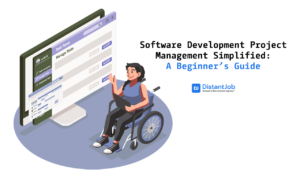The success of high-stakes deliverables, such as developing a new website or a complex app, is not solely attributable to skilled developers; it’s largely due to effective IT project management.
The latest Project Management Institute Pulse report revealed that the role of a project manager helps complete 90% of projects on time, within budget and to scope.
While project management as a whole is primarily tactical the key distinction lies in the strategic aspect of IT project management. Unlike regular project managers who handle logistical details, technical project managers also contribute a strategic perspective, aligning technology initiatives with broader business goals.
In this article, we’ll explore why IT project management is fundamental in software teams, exploring the role of IT project managers and their impact on organizations.
What is IT Project Management?
IT (Information Technology) Project Management is a specialized discipline within project management that focuses on planning, executing, and overseeing technology projects. It’s a transformative approach that turns chaotic challenges into structured opportunities.
This approach, known as ‘decomposition’ in project management terminology, is essential in breaking down tasks into smaller, more manageable components. It not only simplifies tasks but also empowers the project team, mitigating risks, and reducing the ambiguity and anxiety that often accompany challenging projects.
Effective IT Project Management ensures alignment of project goals with business strategy, rigorous risk management, resource allocation, and adherence to project timelines and budget. It involves continuous stakeholder engagement, scope management, and the utilization of project management tools for tracking progress and performance.
IT project managers distinguish themselves from general project managers by having a background in IT, as they need to have a deep understanding of both the technical aspects of the project and the overall business strategy.
What Is The IT Project Lifecycle?
Similarly to SDLC, an IT project lifecycle provides a structured approach to managing IT projects. It sets a foundation that allows tech teams to complete projects successfully from beginning to end, taking into account all the different aspects (budget, stakeholders, resources, etc.)
The stages of the lifecycle depend on the different project methodologies an IT project manager chooses like Agile or Waterfall. But, generally most IT projects have the following phases:
1. Project Initiation
The first step of an IT project is not planning itself, but initiation. During this stage, the project is still not approved. Here’s where IT project managers take a high-level approach to determine whether the project is worth pursuing or not.
They ask important questions to shape the project’s direction:
- Identify stakeholders: Identify and engage with individuals or groups who have an interest in or will be affected by the project.
- Create a project charter: Develop a document that formally authorizes the existence of the project and provides initial project requirements.
- Feasibility analysis: Assess the feasibility of the project in terms of technical, financial, operational, and scheduling aspects.
- Success Metrics: The team establishes clear measures for success.
2. Planning
After the initial project vision is set, the focus shifts to meticulously planning and laying out the groundwork. During this stage, teams need to develop a detailed project plan, outlining tasks, resources, timelines and risks.
The team focuses on critical questions during this phase to create a robust plan:
- Project Goal: What is the ultimate objective of this project?
- Key Performance Indicators (KPIs): How will success be measured? What are the crucial metrics?
- Scope: What is within the project’s boundaries, and what falls outside?
- Budget: What financial resources are allocated for the project?
- Risks: What potential obstacles might the project encounter?
- Team Members: Who are the key players involved?
- Tasks: What specific activities need to be completed?
- Milestones: What are the significant checkpoints in the project timeline?
There are different methods to set project goals but the most popular are SMART and CLEAR. SMART goals are Specific, Measurable, Achievable, Relevant, and Time-bound, providing a framework for setting well-defined and attainable objectives. CLEAR goals are Collaborative, Limited, Emotional, Appreciable, and Refinable, emphasizing a collaborative and adaptable approach to goal-setting in a team context.
3. Execution
This stage is where most of the hard work takes place. IT project managers implement the project plan and carry out the work defined in the project scope. This phase is completed once the derivables are accepted by the users and stakeholders.
During this phase, IT project managers are also responsible for:
- Coordinating people and resources, ensuring that project team members are effectively collaborating and using allocated resources.
- Establishing and maintaining effective communication channels to keep stakeholders informed.
- Managing and executing tasks according to the detailed plan.
4. Monitoring and Controlling
The monitoring and controlling phase happen simultaneously to the execution phase. This ensures that every step is carefully planned and calculated and that there are no mistakes (or if they are, these can be easily identified).
It works similarly to building a house. You do not start making everything at once until it’s finished but each step you review that is solid and won’t cause any problems in the future.
With tech products, project managers make sure that the team is:
- Meeting deadlines
- Sticking with the budget
- Working towards the goal (not losing focus)
Product managers in this phase also monitor metrics and indicators to objectively measure progress and performance. They also identify and solve any issues that may arise during the execution.
All of this monitoring and controlling is also possible with the help of project management tools, in addition to the principles of software project management methodologies (for example, Agile established the importance of daily stand-ups to keep up with everyone’s work)
5. Closing
The project is finalized! The team was able to deliver the project successfully. But before moving on to the next thing, during this phase its important to evaluate the process itself as it can help setting future projects for success.
The closure stage includes:
- Obtain customer or stakeholder acceptance: Confirm that the project’s deliverables meet the agreed-upon requirements.
- Close out contracts: Ensure that all contractual obligations are fulfilled.
- Release project resources: Reassign or release project team members and resources.
- Lessons learned: Document insights gained from the project, including successes and areas for improvement.
- Documentation: Save all project documentation somewhere safe so it can be easily accessed in the future if needed.
6. Post-Implementation Review (Optional)
This stage is not necessary in all cases, as most of the project evaluation takes place in the closing phase, however in some cases it’s useful to analyze more in-depth everything that took place in the project’s execution.
This means:
- Reviewing project performance – Compare the project’s outcomes against its objectives.
- Analyzing results – Examine the effectiveness of project processes and the lessons learned.
- Gathering stakeholder feedback – Obtain input from stakeholders that gives you insights in their perspectives on the project’s success (as well as areas of improvement)
IT Project Management Methodologies
IT project management methodologies are structured approaches or frameworks that are useful to plan, execute and oversee different types of projects. Some methodologies are purpose-built for software development, while others were initially designed for different purposes but can be readily adapted for use in development teams.
These are the most commonly used:
- Waterfall – A sequential and linear approach to project management, where each phase must be completed before moving on to the next.
- Agile – A flexible and iterative methodology that emphasizes adaptability, collaboration, and incremental delivery of software.
- Scrum – Scrum is an Agile framework with specific roles, events, and artifacts, emphasizing iterative development through short, time-boxed cycles called sprints.
- Kanban – A visual and flow-based methodology that focuses on continuous delivery, limiting work in progress, and optimizing efficiency.
- Lean – Lean is a philosophy and methodology aimed at maximizing value while minimizing waste, emphasizing continuous improvement.
- PRINCE2 (PRojects IN Controlled Environments) – A process-driven framework with defined roles and responsibilities, focusing on business justification, and widely used in project management.
- DevOps – A collaborative approach that integrates development and operations to improve deployment frequency, achieve faster time to market, and enhance software quality.
7 Benefits of IT Project Management for Your Company
- Your Company Will Have Strategic Alignment – IT project management ensures that your project aligns with your company’s broader goals, optimizing resources for the long-term.
- Enhanced Project Lifecycle Management – IT project management focuses on navigating and managing each phase of the software development lifecycle efficiently.
- Reliable IT Infrastructure Development – IT project managers facilitate the establishment and enhancement of your company’s IT infrastructure, including networks, servers and databases.
- Successful Technology Implementation – By working with IT project managers you’ll enable a seamless deployment of new systems, applications or solutions.
- Effective Risk Management – IT project management is useful to identify and mitigate potential challenges and uncertainties in projects.
- Engage Stakeholders – Enhance the ability to collaborate and efficiently communicate with project stakeholders, fostering stronger relationships.
- Agile Methodologies Tailored to Your Needs – Guides you in adopting Agile project management approaches, emphasizing adaptability and collaboration for your specific business requirements.
What Do IT Project Managers Do? Main Roles and Responsibilities
An IT project manager is a professional responsible for planning, executing and overseeing IT projects in an organization. Their role involves coordinating different aspects of software project management, including defining project goals, creating project plans, allocating resources, managing budgets, and more.
The responsibilities of an IT project manager include:
- Develop comprehensive project plans outlining tasks, timelines, and resource requirements.
- Define project goals and objectives in alignment with organizational strategies.
- Assemble and lead cross-functional teams, including IT professionals and other stakeholders.
- Efficiently allocate resources, including human capital, time, software tools, and budget, to optimize project outcomes.
- Identify potential risks and uncertainties associated with the project.
- Establish clear and effective communication channels with project stakeholders.
- Implement and oversee quality control measures to ensure deliverables meet specified standards.
- Implement change management strategies to minimize disruptions and maintain project momentum.
- Monitor and manage project budgets to ensure financial objectives are met.
Is IT Project Management Software Necessary?
Yes. Being an IT project manager involves having to overview every single aspect of each project, so you need tools to make your job easier. From organizing tasks and scheduling to keeping in touch with stakeholders, project management software helps you keep all the dots connected.
These are the main benefits of using project management software:
- Project Complexity: Manage tasks, resources, and timelines effectively.
- Team Collaboration: Enhance collaboration in distributed or remote teams.
- Resource Management: Allocate resources efficiently with dedicated features.
- Task Tracking and Visibility: Real-time tracking of tasks and project progress.
- Reporting and Analytics: Analyze project performance for informed decision-making.
- Scalability: Accommodate growing numbers of tasks, users, and projects.
- Integration with Other Tools: Streamline workflows by integrating with communication and file storage tools.
- Compliance and Documentation: Assist in maintaining documentation and ensuring compliance with industry standards.
Popular Project Management Software Options
According to Datanzye, the project management software market share is led by Jira at 36.57%, Microsoft Project at 19.78% and Smartsheet at 5.17%. Here are other well known options:
| Software | Main Characteristics | Suitable for |
| Trello | Kanban-style boards for task management. | Small to medium-sized projects. |
| Asana | Flexible task and project management. | Teams of all sizes. |
| Jira | Advanced features for software development teams. | Software development projects. |
| Microsoft Project | Comprehensive project planning and scheduling. | Large and complex projects. |
| Wrike | Versatile project management with automation. | Teams of various sizes and industries. |
| Monday.com | Visual and collaborative work operating system. | Teams looking for visual project management. |
| Smartsheet | Spreadsheet-like interface for project management. | Teams managing data-intensive projects. |
Checklist: Do You Need To Hire an IT Project Manager?
Unsure if hiring an IT project manager works for your company? Here’s a brief checklist to help you define whether your organization could benefit from the expertise of an IT project manager:
| Criteria | Assessment |
| Complexity of Projects | Are your IT projects becoming increasingly complex? |
| Strategic Alignment | Do your IT projects align with overall business goals? |
| Resource Allocation Challenges | Are you facing difficulties optimizing resource allocation for IT projects? |
| Risk Management Issues | Have you encountered challenges in identifying and mitigating project risks? |
| Customer/ Stakeholder Satisfaction | Is there room for improvement in meeting customer and stakeholder expectations? |
| Change Management Needs | Are you struggling with adapting to changes in project scope or requirements? |
| Technological Advancements | Do you need to incorporate the latest technological trends into your projects? |
If your organization resonates with several of these criteria, hiring an IT project manager could significantly benefit your business strategy.
Why Your Business Can’t Afford to Overlook IT Project Management
From planning IT initiatives to executing projects, IT project management emerges as a key strategy for your organization’s success. The multifaceted expertise of IT project managers and background in IT ensures that you can seamlessly execute technology-driven initiatives.
If you’ve decided that your next step is to hire an IT project manager, we can help you. As a recruitment agency that specializes in tech, we focus on matching businesses of all sizes to hire the talent they deserve. Want to know more? Let’s get in touch.



